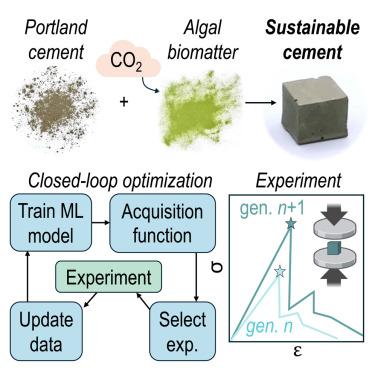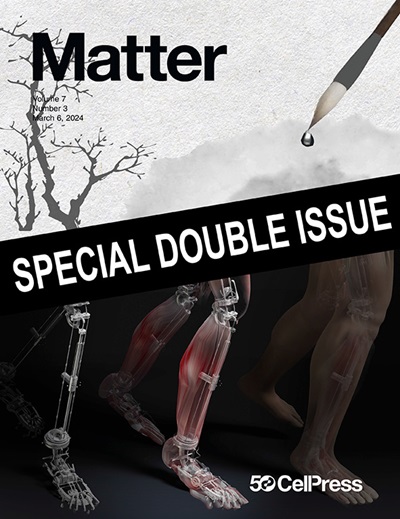Closed-loop optimization using machine learning for the accelerated design of sustainable cements incorporating algal biomatter
IF 17.5
1区 材料科学
Q1 MATERIALS SCIENCE, MULTIDISCIPLINARY
引用次数: 0
Abstract
The substantial embodied carbon of cement, coupled with the ever-increasing need for construction materials, motivates the need for more sustainable cementitious materials. An emerging strategy to mitigate CO2 emissions involves incorporating carbon-negative biomatter; however, this introduces new challenges due to complex hydration-strength relationships and the combinatorial design space. Here, using machine learning, we develop a closed-loop optimization strategy to accelerate green-cement design with minimal CO2 emissions while meeting compressive-strength criterion. Green cements incorporating algae are tested in real time to predict strength evolution, with early-stopping criteria applied to accelerate the optimization process. This approach, using only 28 days of experiment time, attains both the strength requirement and 93% of the achievable improvement in global warming potential (GWP), resulting in a cement that has a 21% reduction in GWP. We further validate model-informed relationships via analysis of hydration, demonstrating the potential for developing materials grounded in scientific understanding.


利用机器学习进行闭环优化,加速设计含有藻类生物物质的可持续水泥
水泥蕴含的大量碳,加上对建筑材料不断增长的需求,激发了对更可持续的水泥材料的需求。减少二氧化碳排放的新战略包括纳入负碳生物物质;然而,由于复杂的水合强度关系和组合设计空间,这带来了新的挑战。在这里,利用机器学习,我们开发了一个闭环优化策略,以最小的二氧化碳排放加速绿色水泥的设计,同时满足抗压强度标准。通过对含有藻类的绿色水泥进行实时测试,预测其强度变化,并采用早期停止标准来加速优化过程。这种方法只需要28天的实验时间,就可以同时达到强度要求和93%的全球变暖潜能值(GWP)可实现改善,从而使水泥的全球变暖潜能值降低21%。我们通过水化分析进一步验证了模型信息关系,展示了开发基于科学理解的材料的潜力。
本文章由计算机程序翻译,如有差异,请以英文原文为准。
求助全文
约1分钟内获得全文
求助全文
来源期刊

Matter
MATERIALS SCIENCE, MULTIDISCIPLINARY-
CiteScore
26.30
自引率
2.60%
发文量
367
期刊介绍:
Matter, a monthly journal affiliated with Cell, spans the broad field of materials science from nano to macro levels,covering fundamentals to applications. Embracing groundbreaking technologies,it includes full-length research articles,reviews, perspectives,previews, opinions, personnel stories, and general editorial content.
Matter aims to be the primary resource for researchers in academia and industry, inspiring the next generation of materials scientists.
 求助内容:
求助内容: 应助结果提醒方式:
应助结果提醒方式:


